POLICING: Analysis of Ethical and Legal Issues in UK Policing
VerifiedAdded on 2020/04/15
|15
|3746
|43
Report
AI Summary
This report provides a comprehensive analysis of the ethical and legal considerations within UK policing. It begins by examining the Code of Ethics and the responsibilities of police officers, emphasizing integrity, honesty, and impartiality. The report then delves into relevant legislation, including the Police (Health and Safety) Act 1997, the European Convention of Human Rights, and the Equality Act 2010, highlighting their impact on police conduct and duties. It explores the importance of human rights, discrimination prevention, and fair treatment. Furthermore, the report addresses police responses to various incidents, including critical/major incidents and road policing, detailing procedures and the importance of community trust and effective management. Overall, the report offers a detailed overview of the legal and ethical framework governing UK policing and how police officers should act.
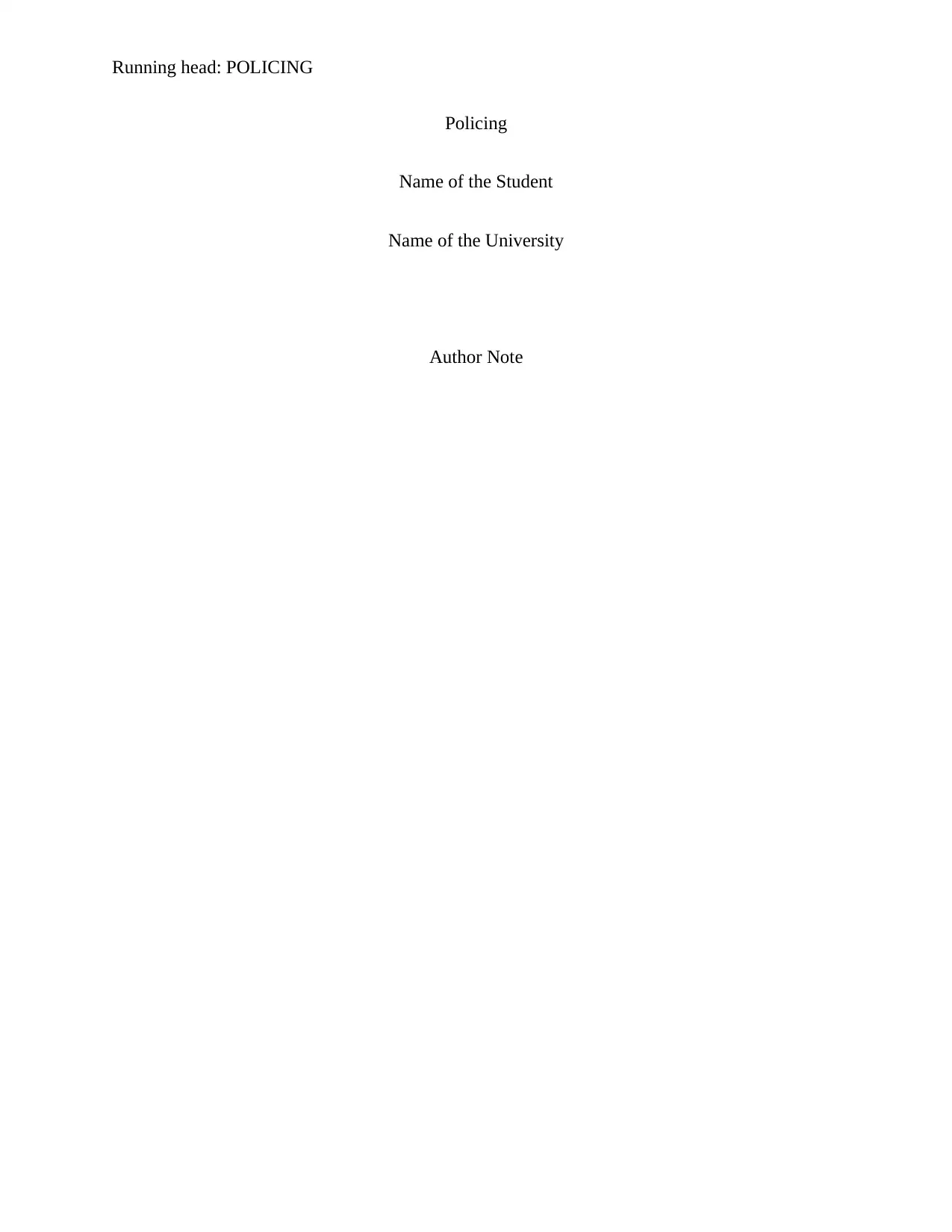
Running head: POLICING
Policing
Name of the Student
Name of the University
Author Note
Policing
Name of the Student
Name of the University
Author Note
Paraphrase This Document
Need a fresh take? Get an instant paraphrase of this document with our AI Paraphraser
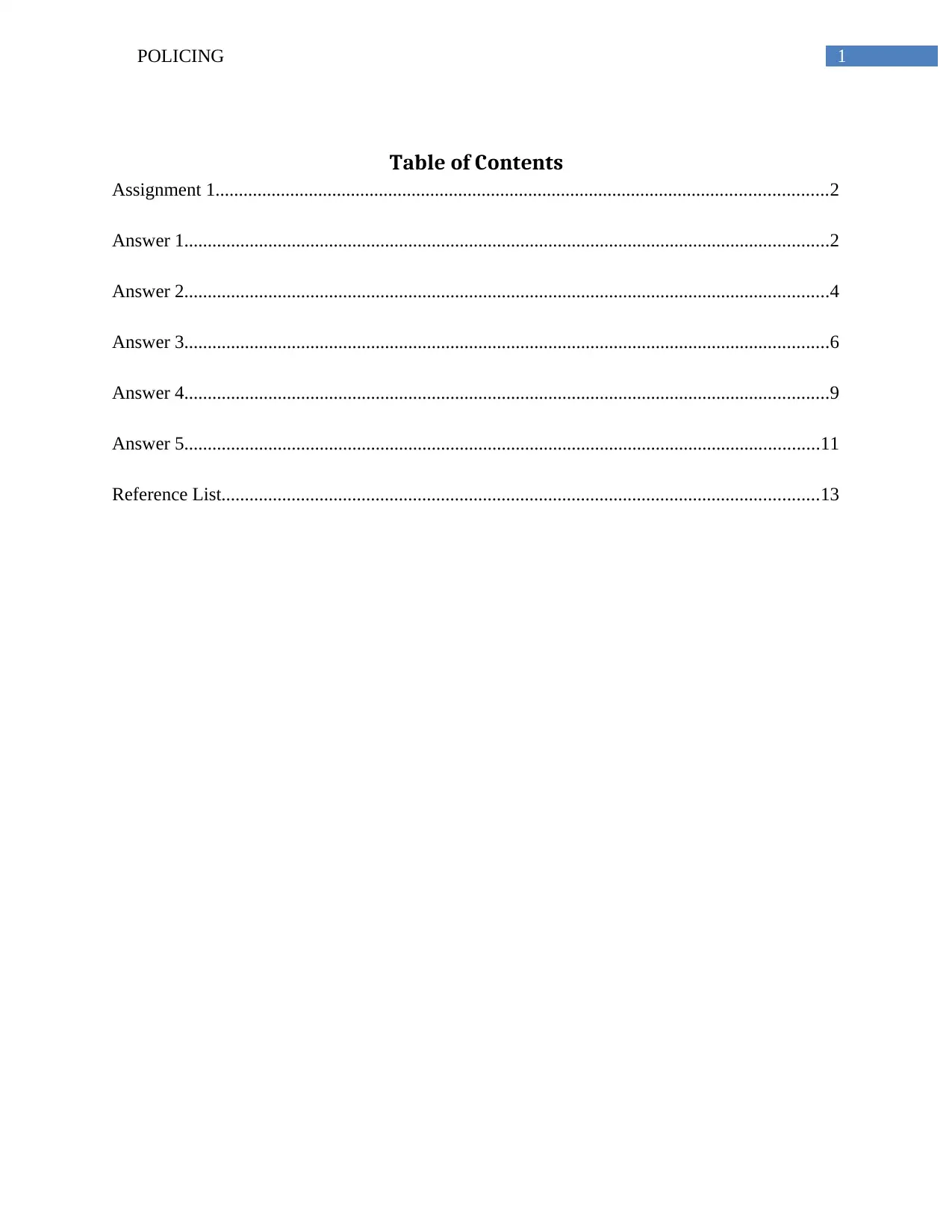
1POLICING
Table of Contents
Assignment 1...................................................................................................................................2
Answer 1..........................................................................................................................................2
Answer 2..........................................................................................................................................4
Answer 3..........................................................................................................................................6
Answer 4..........................................................................................................................................9
Answer 5........................................................................................................................................11
Reference List................................................................................................................................13
Table of Contents
Assignment 1...................................................................................................................................2
Answer 1..........................................................................................................................................2
Answer 2..........................................................................................................................................4
Answer 3..........................................................................................................................................6
Answer 4..........................................................................................................................................9
Answer 5........................................................................................................................................11
Reference List................................................................................................................................13
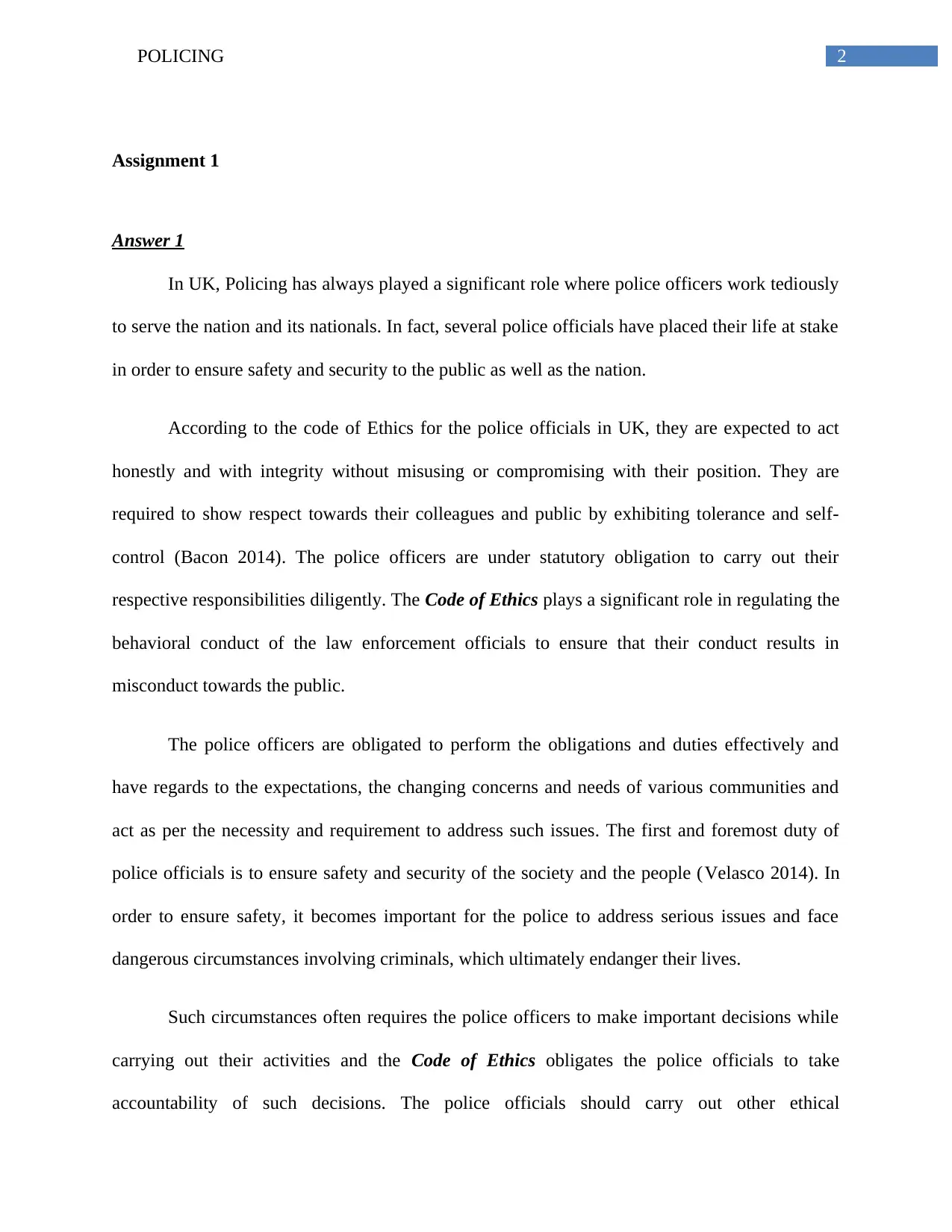
2POLICING
Assignment 1
Answer 1
In UK, Policing has always played a significant role where police officers work tediously
to serve the nation and its nationals. In fact, several police officials have placed their life at stake
in order to ensure safety and security to the public as well as the nation.
According to the code of Ethics for the police officials in UK, they are expected to act
honestly and with integrity without misusing or compromising with their position. They are
required to show respect towards their colleagues and public by exhibiting tolerance and self-
control (Bacon 2014). The police officers are under statutory obligation to carry out their
respective responsibilities diligently. The Code of Ethics plays a significant role in regulating the
behavioral conduct of the law enforcement officials to ensure that their conduct results in
misconduct towards the public.
The police officers are obligated to perform the obligations and duties effectively and
have regards to the expectations, the changing concerns and needs of various communities and
act as per the necessity and requirement to address such issues. The first and foremost duty of
police officials is to ensure safety and security of the society and the people (Velasco 2014). In
order to ensure safety, it becomes important for the police to address serious issues and face
dangerous circumstances involving criminals, which ultimately endanger their lives.
Such circumstances often requires the police officers to make important decisions while
carrying out their activities and the Code of Ethics obligates the police officials to take
accountability of such decisions. The police officials should carry out other ethical
Assignment 1
Answer 1
In UK, Policing has always played a significant role where police officers work tediously
to serve the nation and its nationals. In fact, several police officials have placed their life at stake
in order to ensure safety and security to the public as well as the nation.
According to the code of Ethics for the police officials in UK, they are expected to act
honestly and with integrity without misusing or compromising with their position. They are
required to show respect towards their colleagues and public by exhibiting tolerance and self-
control (Bacon 2014). The police officers are under statutory obligation to carry out their
respective responsibilities diligently. The Code of Ethics plays a significant role in regulating the
behavioral conduct of the law enforcement officials to ensure that their conduct results in
misconduct towards the public.
The police officers are obligated to perform the obligations and duties effectively and
have regards to the expectations, the changing concerns and needs of various communities and
act as per the necessity and requirement to address such issues. The first and foremost duty of
police officials is to ensure safety and security of the society and the people (Velasco 2014). In
order to ensure safety, it becomes important for the police to address serious issues and face
dangerous circumstances involving criminals, which ultimately endanger their lives.
Such circumstances often requires the police officers to make important decisions while
carrying out their activities and the Code of Ethics obligates the police officials to take
accountability of such decisions. The police officials should carry out other ethical
⊘ This is a preview!⊘
Do you want full access?
Subscribe today to unlock all pages.

Trusted by 1+ million students worldwide
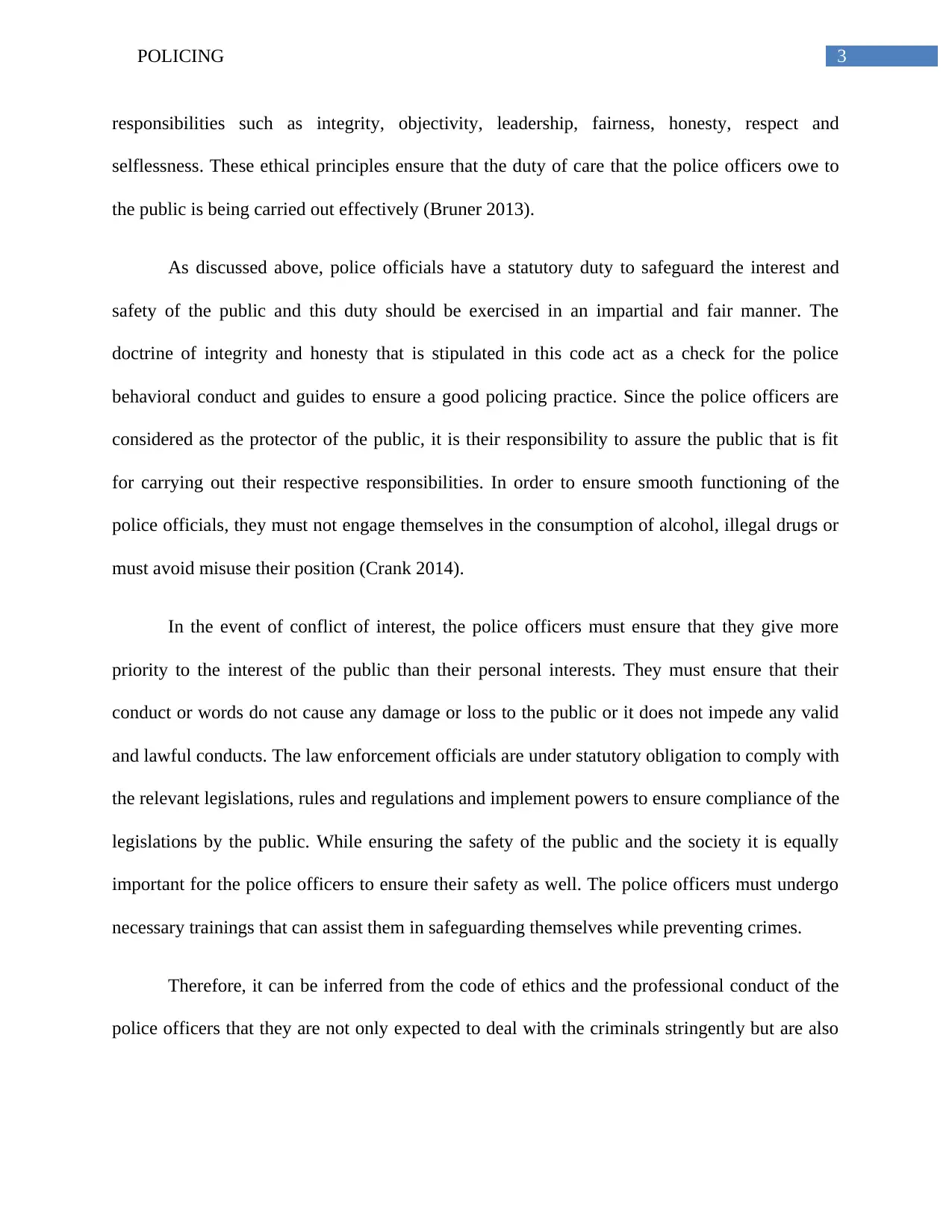
3POLICING
responsibilities such as integrity, objectivity, leadership, fairness, honesty, respect and
selflessness. These ethical principles ensure that the duty of care that the police officers owe to
the public is being carried out effectively (Bruner 2013).
As discussed above, police officials have a statutory duty to safeguard the interest and
safety of the public and this duty should be exercised in an impartial and fair manner. The
doctrine of integrity and honesty that is stipulated in this code act as a check for the police
behavioral conduct and guides to ensure a good policing practice. Since the police officers are
considered as the protector of the public, it is their responsibility to assure the public that is fit
for carrying out their respective responsibilities. In order to ensure smooth functioning of the
police officials, they must not engage themselves in the consumption of alcohol, illegal drugs or
must avoid misuse their position (Crank 2014).
In the event of conflict of interest, the police officers must ensure that they give more
priority to the interest of the public than their personal interests. They must ensure that their
conduct or words do not cause any damage or loss to the public or it does not impede any valid
and lawful conducts. The law enforcement officials are under statutory obligation to comply with
the relevant legislations, rules and regulations and implement powers to ensure compliance of the
legislations by the public. While ensuring the safety of the public and the society it is equally
important for the police officers to ensure their safety as well. The police officers must undergo
necessary trainings that can assist them in safeguarding themselves while preventing crimes.
Therefore, it can be inferred from the code of ethics and the professional conduct of the
police officers that they are not only expected to deal with the criminals stringently but are also
responsibilities such as integrity, objectivity, leadership, fairness, honesty, respect and
selflessness. These ethical principles ensure that the duty of care that the police officers owe to
the public is being carried out effectively (Bruner 2013).
As discussed above, police officials have a statutory duty to safeguard the interest and
safety of the public and this duty should be exercised in an impartial and fair manner. The
doctrine of integrity and honesty that is stipulated in this code act as a check for the police
behavioral conduct and guides to ensure a good policing practice. Since the police officers are
considered as the protector of the public, it is their responsibility to assure the public that is fit
for carrying out their respective responsibilities. In order to ensure smooth functioning of the
police officials, they must not engage themselves in the consumption of alcohol, illegal drugs or
must avoid misuse their position (Crank 2014).
In the event of conflict of interest, the police officers must ensure that they give more
priority to the interest of the public than their personal interests. They must ensure that their
conduct or words do not cause any damage or loss to the public or it does not impede any valid
and lawful conducts. The law enforcement officials are under statutory obligation to comply with
the relevant legislations, rules and regulations and implement powers to ensure compliance of the
legislations by the public. While ensuring the safety of the public and the society it is equally
important for the police officers to ensure their safety as well. The police officers must undergo
necessary trainings that can assist them in safeguarding themselves while preventing crimes.
Therefore, it can be inferred from the code of ethics and the professional conduct of the
police officers that they are not only expected to deal with the criminals stringently but are also
Paraphrase This Document
Need a fresh take? Get an instant paraphrase of this document with our AI Paraphraser
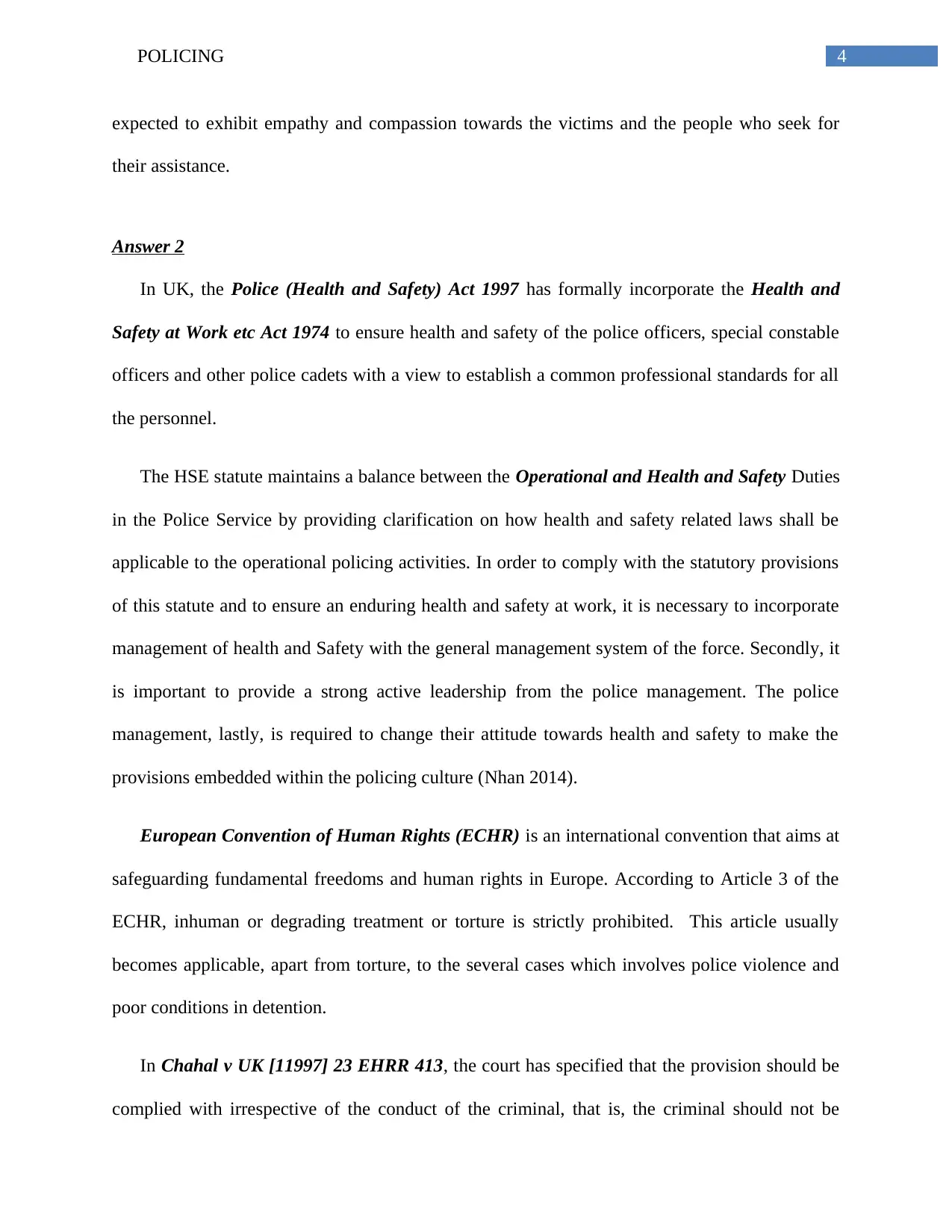
4POLICING
expected to exhibit empathy and compassion towards the victims and the people who seek for
their assistance.
Answer 2
In UK, the Police (Health and Safety) Act 1997 has formally incorporate the Health and
Safety at Work etc Act 1974 to ensure health and safety of the police officers, special constable
officers and other police cadets with a view to establish a common professional standards for all
the personnel.
The HSE statute maintains a balance between the Operational and Health and Safety Duties
in the Police Service by providing clarification on how health and safety related laws shall be
applicable to the operational policing activities. In order to comply with the statutory provisions
of this statute and to ensure an enduring health and safety at work, it is necessary to incorporate
management of health and Safety with the general management system of the force. Secondly, it
is important to provide a strong active leadership from the police management. The police
management, lastly, is required to change their attitude towards health and safety to make the
provisions embedded within the policing culture (Nhan 2014).
European Convention of Human Rights (ECHR) is an international convention that aims at
safeguarding fundamental freedoms and human rights in Europe. According to Article 3 of the
ECHR, inhuman or degrading treatment or torture is strictly prohibited. This article usually
becomes applicable, apart from torture, to the several cases which involves police violence and
poor conditions in detention.
In Chahal v UK [11997] 23 EHRR 413, the court has specified that the provision should be
complied with irrespective of the conduct of the criminal, that is, the criminal should not be
expected to exhibit empathy and compassion towards the victims and the people who seek for
their assistance.
Answer 2
In UK, the Police (Health and Safety) Act 1997 has formally incorporate the Health and
Safety at Work etc Act 1974 to ensure health and safety of the police officers, special constable
officers and other police cadets with a view to establish a common professional standards for all
the personnel.
The HSE statute maintains a balance between the Operational and Health and Safety Duties
in the Police Service by providing clarification on how health and safety related laws shall be
applicable to the operational policing activities. In order to comply with the statutory provisions
of this statute and to ensure an enduring health and safety at work, it is necessary to incorporate
management of health and Safety with the general management system of the force. Secondly, it
is important to provide a strong active leadership from the police management. The police
management, lastly, is required to change their attitude towards health and safety to make the
provisions embedded within the policing culture (Nhan 2014).
European Convention of Human Rights (ECHR) is an international convention that aims at
safeguarding fundamental freedoms and human rights in Europe. According to Article 3 of the
ECHR, inhuman or degrading treatment or torture is strictly prohibited. This article usually
becomes applicable, apart from torture, to the several cases which involves police violence and
poor conditions in detention.
In Chahal v UK [11997] 23 EHRR 413, the court has specified that the provision should be
complied with irrespective of the conduct of the criminal, that is, the criminal should not be
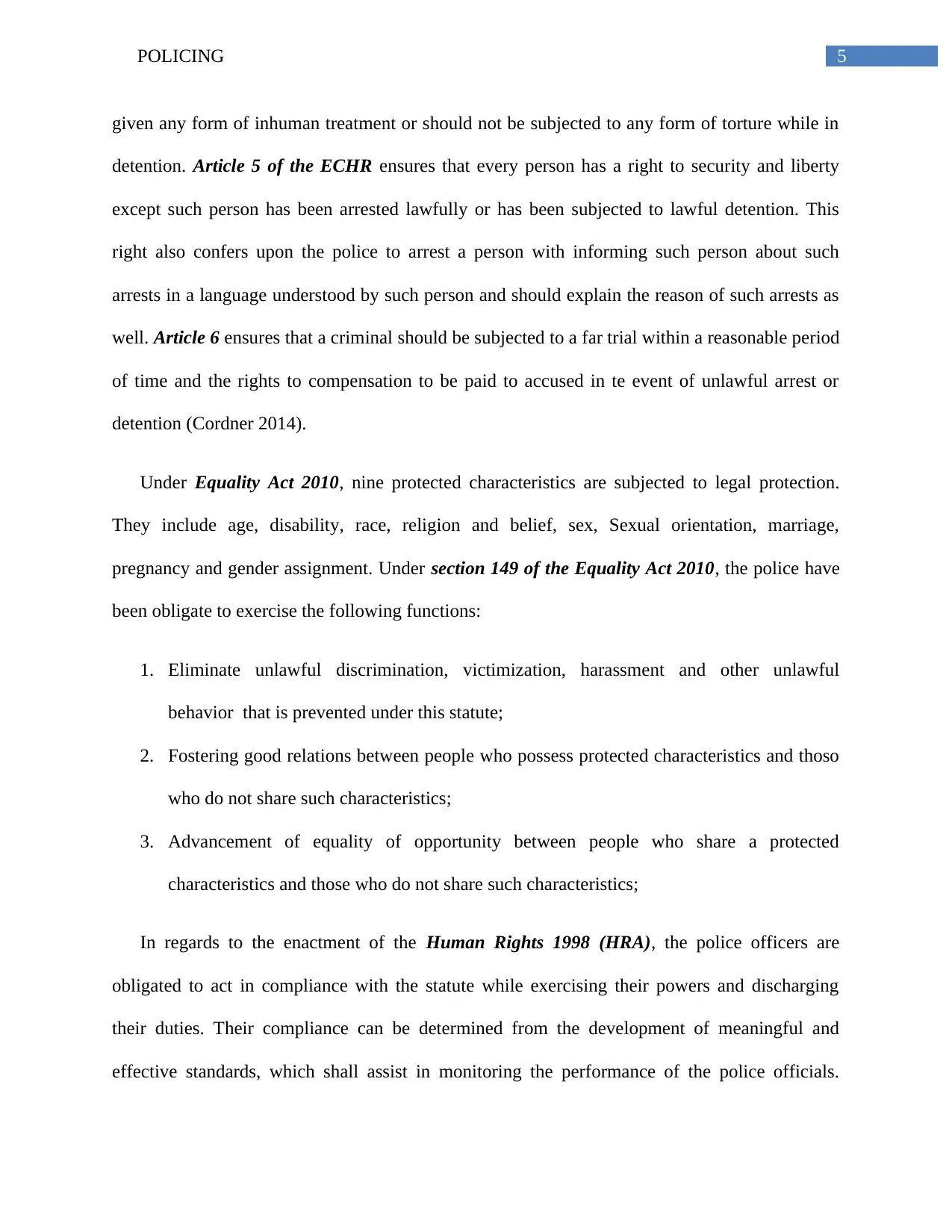
5POLICING
given any form of inhuman treatment or should not be subjected to any form of torture while in
detention. Article 5 of the ECHR ensures that every person has a right to security and liberty
except such person has been arrested lawfully or has been subjected to lawful detention. This
right also confers upon the police to arrest a person with informing such person about such
arrests in a language understood by such person and should explain the reason of such arrests as
well. Article 6 ensures that a criminal should be subjected to a far trial within a reasonable period
of time and the rights to compensation to be paid to accused in te event of unlawful arrest or
detention (Cordner 2014).
Under Equality Act 2010, nine protected characteristics are subjected to legal protection.
They include age, disability, race, religion and belief, sex, Sexual orientation, marriage,
pregnancy and gender assignment. Under section 149 of the Equality Act 2010, the police have
been obligate to exercise the following functions:
1. Eliminate unlawful discrimination, victimization, harassment and other unlawful
behavior that is prevented under this statute;
2. Fostering good relations between people who possess protected characteristics and thoso
who do not share such characteristics;
3. Advancement of equality of opportunity between people who share a protected
characteristics and those who do not share such characteristics;
In regards to the enactment of the Human Rights 1998 (HRA), the police officers are
obligated to act in compliance with the statute while exercising their powers and discharging
their duties. Their compliance can be determined from the development of meaningful and
effective standards, which shall assist in monitoring the performance of the police officials.
given any form of inhuman treatment or should not be subjected to any form of torture while in
detention. Article 5 of the ECHR ensures that every person has a right to security and liberty
except such person has been arrested lawfully or has been subjected to lawful detention. This
right also confers upon the police to arrest a person with informing such person about such
arrests in a language understood by such person and should explain the reason of such arrests as
well. Article 6 ensures that a criminal should be subjected to a far trial within a reasonable period
of time and the rights to compensation to be paid to accused in te event of unlawful arrest or
detention (Cordner 2014).
Under Equality Act 2010, nine protected characteristics are subjected to legal protection.
They include age, disability, race, religion and belief, sex, Sexual orientation, marriage,
pregnancy and gender assignment. Under section 149 of the Equality Act 2010, the police have
been obligate to exercise the following functions:
1. Eliminate unlawful discrimination, victimization, harassment and other unlawful
behavior that is prevented under this statute;
2. Fostering good relations between people who possess protected characteristics and thoso
who do not share such characteristics;
3. Advancement of equality of opportunity between people who share a protected
characteristics and those who do not share such characteristics;
In regards to the enactment of the Human Rights 1998 (HRA), the police officers are
obligated to act in compliance with the statute while exercising their powers and discharging
their duties. Their compliance can be determined from the development of meaningful and
effective standards, which shall assist in monitoring the performance of the police officials.
⊘ This is a preview!⊘
Do you want full access?
Subscribe today to unlock all pages.

Trusted by 1+ million students worldwide
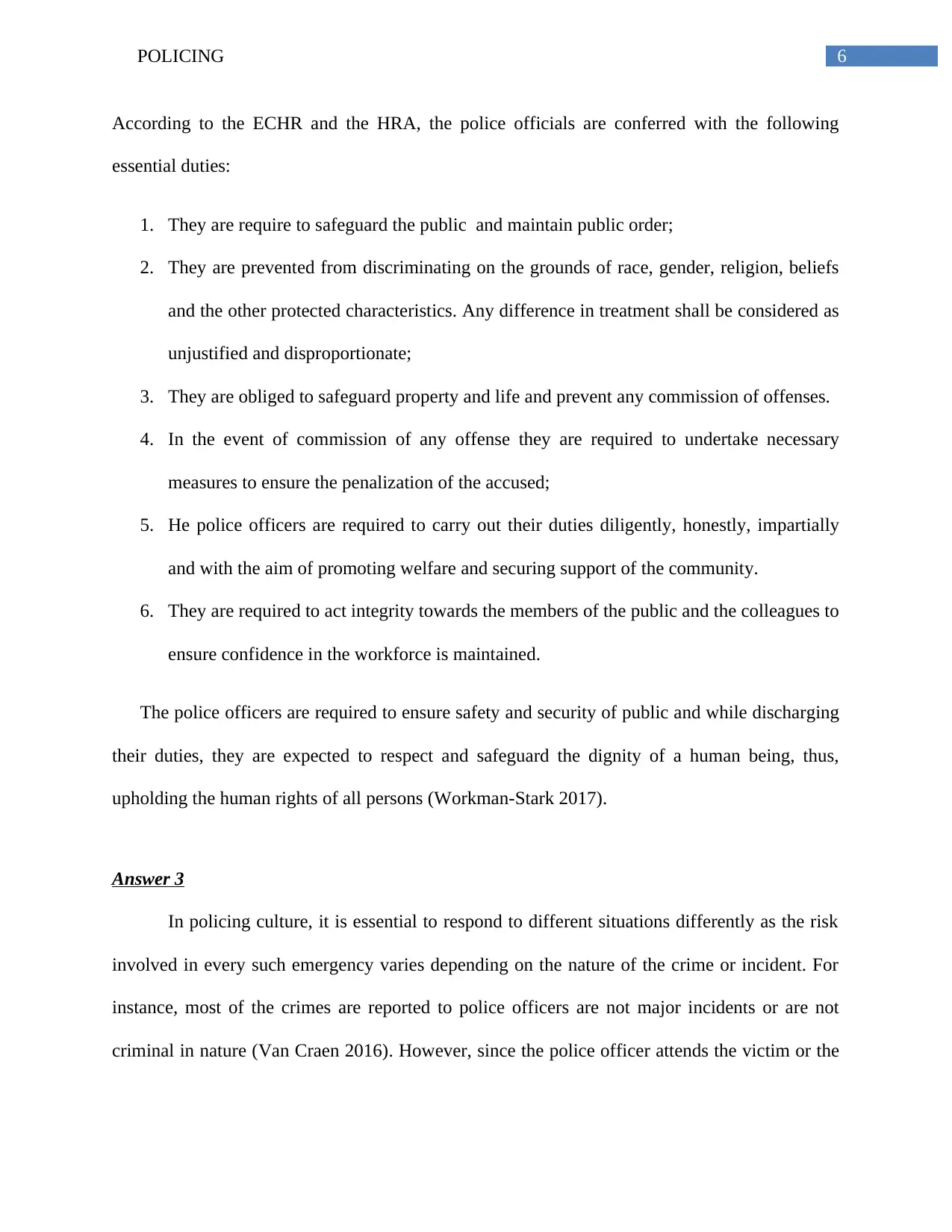
6POLICING
According to the ECHR and the HRA, the police officials are conferred with the following
essential duties:
1. They are require to safeguard the public and maintain public order;
2. They are prevented from discriminating on the grounds of race, gender, religion, beliefs
and the other protected characteristics. Any difference in treatment shall be considered as
unjustified and disproportionate;
3. They are obliged to safeguard property and life and prevent any commission of offenses.
4. In the event of commission of any offense they are required to undertake necessary
measures to ensure the penalization of the accused;
5. He police officers are required to carry out their duties diligently, honestly, impartially
and with the aim of promoting welfare and securing support of the community.
6. They are required to act integrity towards the members of the public and the colleagues to
ensure confidence in the workforce is maintained.
The police officers are required to ensure safety and security of public and while discharging
their duties, they are expected to respect and safeguard the dignity of a human being, thus,
upholding the human rights of all persons (Workman-Stark 2017).
Answer 3
In policing culture, it is essential to respond to different situations differently as the risk
involved in every such emergency varies depending on the nature of the crime or incident. For
instance, most of the crimes are reported to police officers are not major incidents or are not
criminal in nature (Van Craen 2016). However, since the police officer attends the victim or the
According to the ECHR and the HRA, the police officials are conferred with the following
essential duties:
1. They are require to safeguard the public and maintain public order;
2. They are prevented from discriminating on the grounds of race, gender, religion, beliefs
and the other protected characteristics. Any difference in treatment shall be considered as
unjustified and disproportionate;
3. They are obliged to safeguard property and life and prevent any commission of offenses.
4. In the event of commission of any offense they are required to undertake necessary
measures to ensure the penalization of the accused;
5. He police officers are required to carry out their duties diligently, honestly, impartially
and with the aim of promoting welfare and securing support of the community.
6. They are required to act integrity towards the members of the public and the colleagues to
ensure confidence in the workforce is maintained.
The police officers are required to ensure safety and security of public and while discharging
their duties, they are expected to respect and safeguard the dignity of a human being, thus,
upholding the human rights of all persons (Workman-Stark 2017).
Answer 3
In policing culture, it is essential to respond to different situations differently as the risk
involved in every such emergency varies depending on the nature of the crime or incident. For
instance, most of the crimes are reported to police officers are not major incidents or are not
criminal in nature (Van Craen 2016). However, since the police officer attends the victim or the
Paraphrase This Document
Need a fresh take? Get an instant paraphrase of this document with our AI Paraphraser
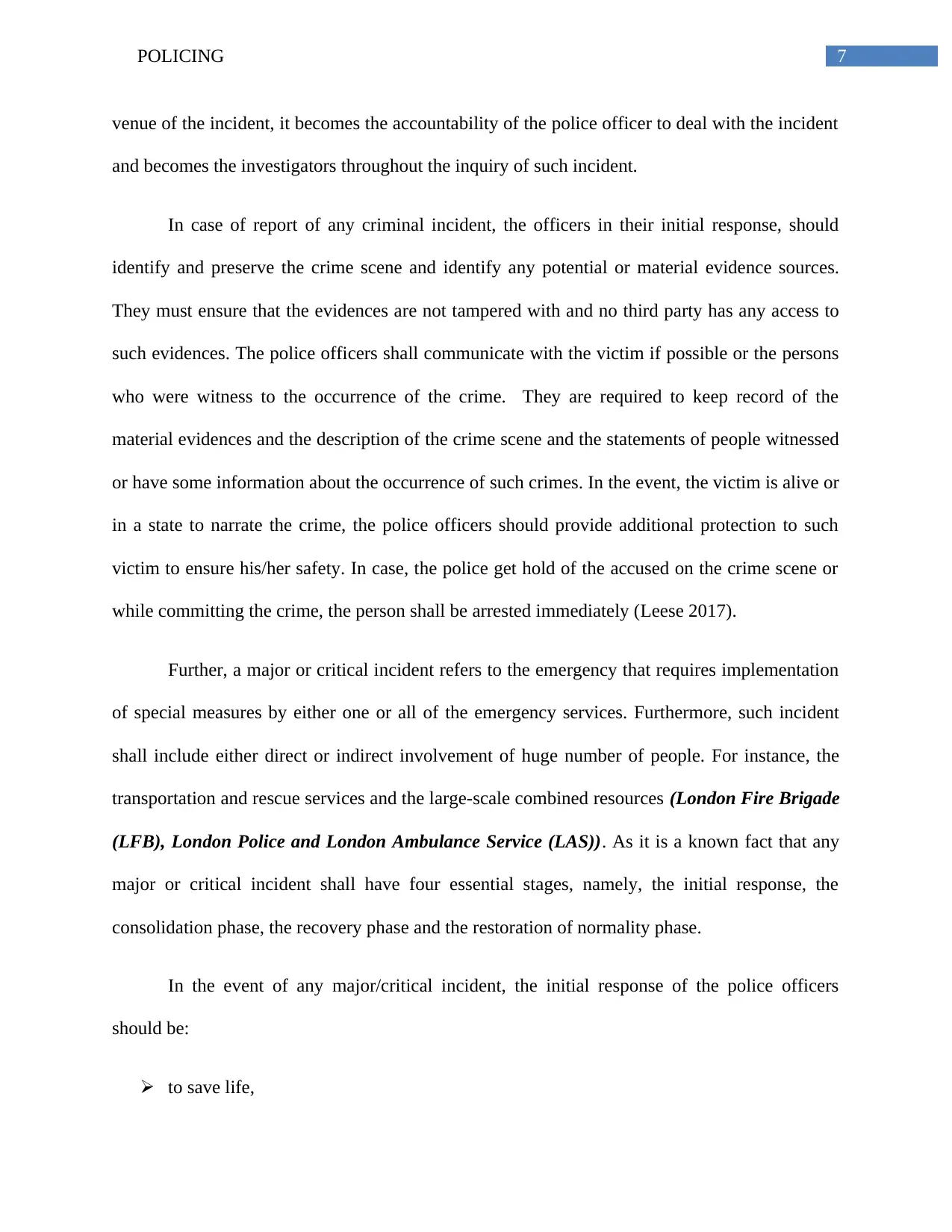
7POLICING
venue of the incident, it becomes the accountability of the police officer to deal with the incident
and becomes the investigators throughout the inquiry of such incident.
In case of report of any criminal incident, the officers in their initial response, should
identify and preserve the crime scene and identify any potential or material evidence sources.
They must ensure that the evidences are not tampered with and no third party has any access to
such evidences. The police officers shall communicate with the victim if possible or the persons
who were witness to the occurrence of the crime. They are required to keep record of the
material evidences and the description of the crime scene and the statements of people witnessed
or have some information about the occurrence of such crimes. In the event, the victim is alive or
in a state to narrate the crime, the police officers should provide additional protection to such
victim to ensure his/her safety. In case, the police get hold of the accused on the crime scene or
while committing the crime, the person shall be arrested immediately (Leese 2017).
Further, a major or critical incident refers to the emergency that requires implementation
of special measures by either one or all of the emergency services. Furthermore, such incident
shall include either direct or indirect involvement of huge number of people. For instance, the
transportation and rescue services and the large-scale combined resources (London Fire Brigade
(LFB), London Police and London Ambulance Service (LAS)). As it is a known fact that any
major or critical incident shall have four essential stages, namely, the initial response, the
consolidation phase, the recovery phase and the restoration of normality phase.
In the event of any major/critical incident, the initial response of the police officers
should be:
to save life,
venue of the incident, it becomes the accountability of the police officer to deal with the incident
and becomes the investigators throughout the inquiry of such incident.
In case of report of any criminal incident, the officers in their initial response, should
identify and preserve the crime scene and identify any potential or material evidence sources.
They must ensure that the evidences are not tampered with and no third party has any access to
such evidences. The police officers shall communicate with the victim if possible or the persons
who were witness to the occurrence of the crime. They are required to keep record of the
material evidences and the description of the crime scene and the statements of people witnessed
or have some information about the occurrence of such crimes. In the event, the victim is alive or
in a state to narrate the crime, the police officers should provide additional protection to such
victim to ensure his/her safety. In case, the police get hold of the accused on the crime scene or
while committing the crime, the person shall be arrested immediately (Leese 2017).
Further, a major or critical incident refers to the emergency that requires implementation
of special measures by either one or all of the emergency services. Furthermore, such incident
shall include either direct or indirect involvement of huge number of people. For instance, the
transportation and rescue services and the large-scale combined resources (London Fire Brigade
(LFB), London Police and London Ambulance Service (LAS)). As it is a known fact that any
major or critical incident shall have four essential stages, namely, the initial response, the
consolidation phase, the recovery phase and the restoration of normality phase.
In the event of any major/critical incident, the initial response of the police officers
should be:
to save life,
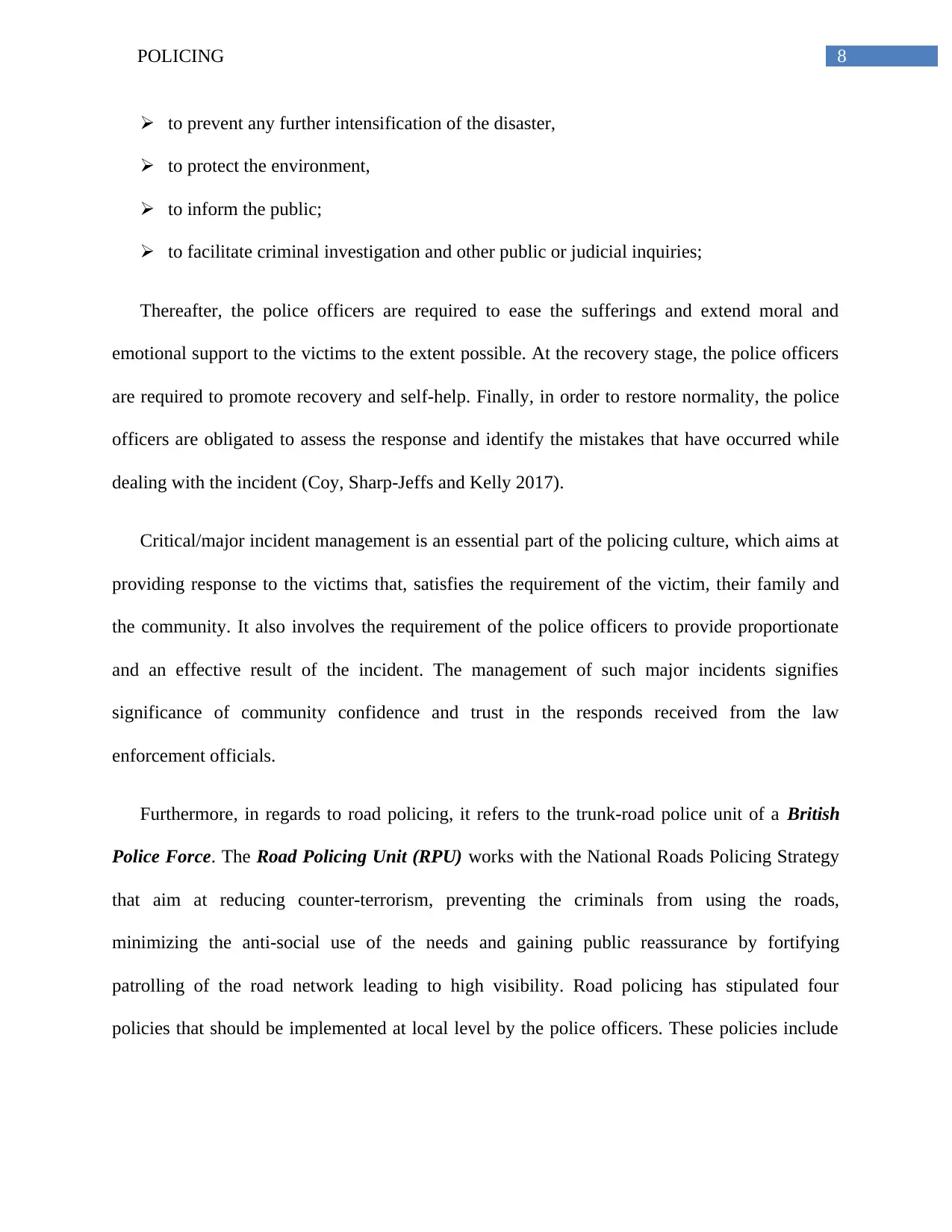
8POLICING
to prevent any further intensification of the disaster,
to protect the environment,
to inform the public;
to facilitate criminal investigation and other public or judicial inquiries;
Thereafter, the police officers are required to ease the sufferings and extend moral and
emotional support to the victims to the extent possible. At the recovery stage, the police officers
are required to promote recovery and self-help. Finally, in order to restore normality, the police
officers are obligated to assess the response and identify the mistakes that have occurred while
dealing with the incident (Coy, Sharp-Jeffs and Kelly 2017).
Critical/major incident management is an essential part of the policing culture, which aims at
providing response to the victims that, satisfies the requirement of the victim, their family and
the community. It also involves the requirement of the police officers to provide proportionate
and an effective result of the incident. The management of such major incidents signifies
significance of community confidence and trust in the responds received from the law
enforcement officials.
Furthermore, in regards to road policing, it refers to the trunk-road police unit of a British
Police Force. The Road Policing Unit (RPU) works with the National Roads Policing Strategy
that aim at reducing counter-terrorism, preventing the criminals from using the roads,
minimizing the anti-social use of the needs and gaining public reassurance by fortifying
patrolling of the road network leading to high visibility. Road policing has stipulated four
policies that should be implemented at local level by the police officers. These policies include
to prevent any further intensification of the disaster,
to protect the environment,
to inform the public;
to facilitate criminal investigation and other public or judicial inquiries;
Thereafter, the police officers are required to ease the sufferings and extend moral and
emotional support to the victims to the extent possible. At the recovery stage, the police officers
are required to promote recovery and self-help. Finally, in order to restore normality, the police
officers are obligated to assess the response and identify the mistakes that have occurred while
dealing with the incident (Coy, Sharp-Jeffs and Kelly 2017).
Critical/major incident management is an essential part of the policing culture, which aims at
providing response to the victims that, satisfies the requirement of the victim, their family and
the community. It also involves the requirement of the police officers to provide proportionate
and an effective result of the incident. The management of such major incidents signifies
significance of community confidence and trust in the responds received from the law
enforcement officials.
Furthermore, in regards to road policing, it refers to the trunk-road police unit of a British
Police Force. The Road Policing Unit (RPU) works with the National Roads Policing Strategy
that aim at reducing counter-terrorism, preventing the criminals from using the roads,
minimizing the anti-social use of the needs and gaining public reassurance by fortifying
patrolling of the road network leading to high visibility. Road policing has stipulated four
policies that should be implemented at local level by the police officers. These policies include
⊘ This is a preview!⊘
Do you want full access?
Subscribe today to unlock all pages.

Trusted by 1+ million students worldwide
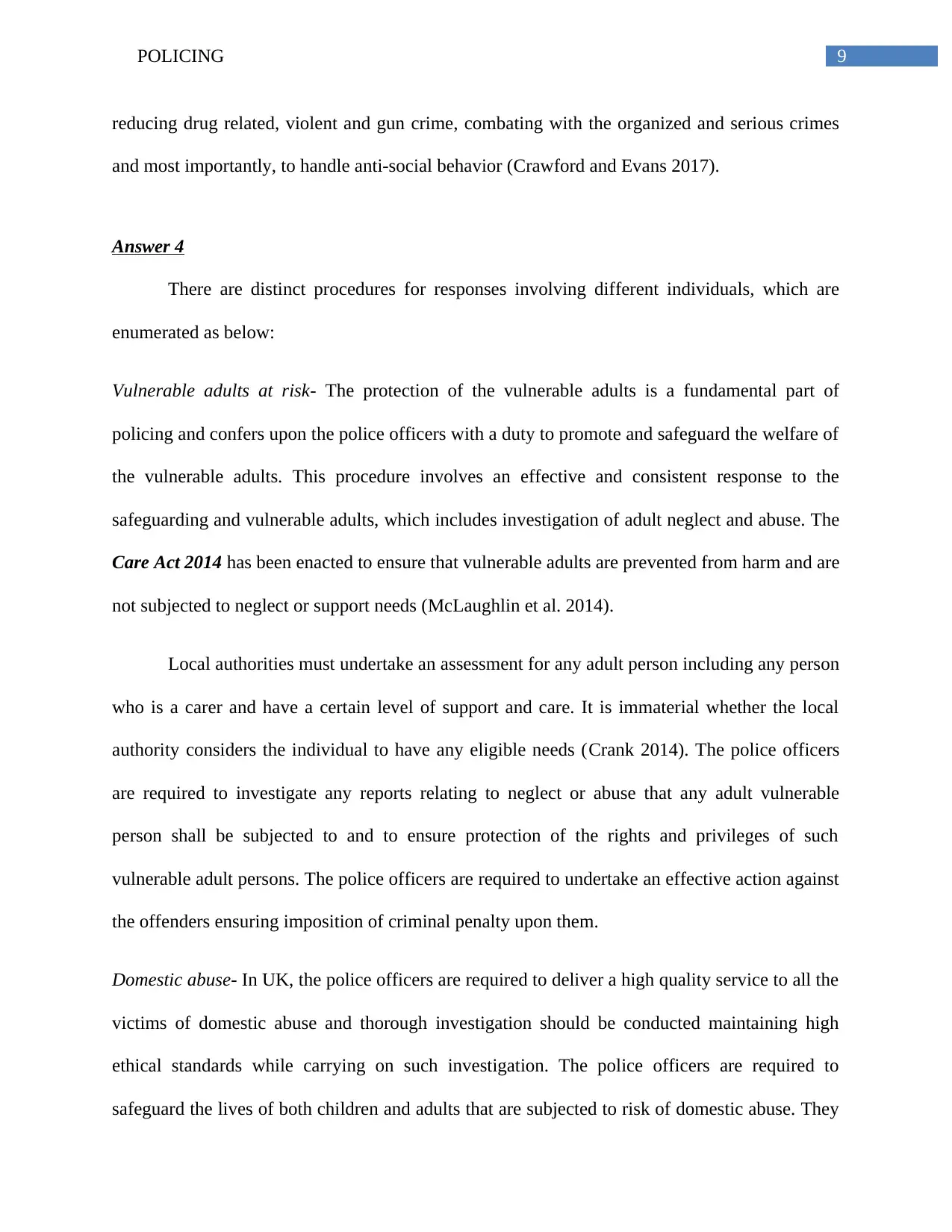
9POLICING
reducing drug related, violent and gun crime, combating with the organized and serious crimes
and most importantly, to handle anti-social behavior (Crawford and Evans 2017).
Answer 4
There are distinct procedures for responses involving different individuals, which are
enumerated as below:
Vulnerable adults at risk- The protection of the vulnerable adults is a fundamental part of
policing and confers upon the police officers with a duty to promote and safeguard the welfare of
the vulnerable adults. This procedure involves an effective and consistent response to the
safeguarding and vulnerable adults, which includes investigation of adult neglect and abuse. The
Care Act 2014 has been enacted to ensure that vulnerable adults are prevented from harm and are
not subjected to neglect or support needs (McLaughlin et al. 2014).
Local authorities must undertake an assessment for any adult person including any person
who is a carer and have a certain level of support and care. It is immaterial whether the local
authority considers the individual to have any eligible needs (Crank 2014). The police officers
are required to investigate any reports relating to neglect or abuse that any adult vulnerable
person shall be subjected to and to ensure protection of the rights and privileges of such
vulnerable adult persons. The police officers are required to undertake an effective action against
the offenders ensuring imposition of criminal penalty upon them.
Domestic abuse- In UK, the police officers are required to deliver a high quality service to all the
victims of domestic abuse and thorough investigation should be conducted maintaining high
ethical standards while carrying on such investigation. The police officers are required to
safeguard the lives of both children and adults that are subjected to risk of domestic abuse. They
reducing drug related, violent and gun crime, combating with the organized and serious crimes
and most importantly, to handle anti-social behavior (Crawford and Evans 2017).
Answer 4
There are distinct procedures for responses involving different individuals, which are
enumerated as below:
Vulnerable adults at risk- The protection of the vulnerable adults is a fundamental part of
policing and confers upon the police officers with a duty to promote and safeguard the welfare of
the vulnerable adults. This procedure involves an effective and consistent response to the
safeguarding and vulnerable adults, which includes investigation of adult neglect and abuse. The
Care Act 2014 has been enacted to ensure that vulnerable adults are prevented from harm and are
not subjected to neglect or support needs (McLaughlin et al. 2014).
Local authorities must undertake an assessment for any adult person including any person
who is a carer and have a certain level of support and care. It is immaterial whether the local
authority considers the individual to have any eligible needs (Crank 2014). The police officers
are required to investigate any reports relating to neglect or abuse that any adult vulnerable
person shall be subjected to and to ensure protection of the rights and privileges of such
vulnerable adult persons. The police officers are required to undertake an effective action against
the offenders ensuring imposition of criminal penalty upon them.
Domestic abuse- In UK, the police officers are required to deliver a high quality service to all the
victims of domestic abuse and thorough investigation should be conducted maintaining high
ethical standards while carrying on such investigation. The police officers are required to
safeguard the lives of both children and adults that are subjected to risk of domestic abuse. They
Paraphrase This Document
Need a fresh take? Get an instant paraphrase of this document with our AI Paraphraser
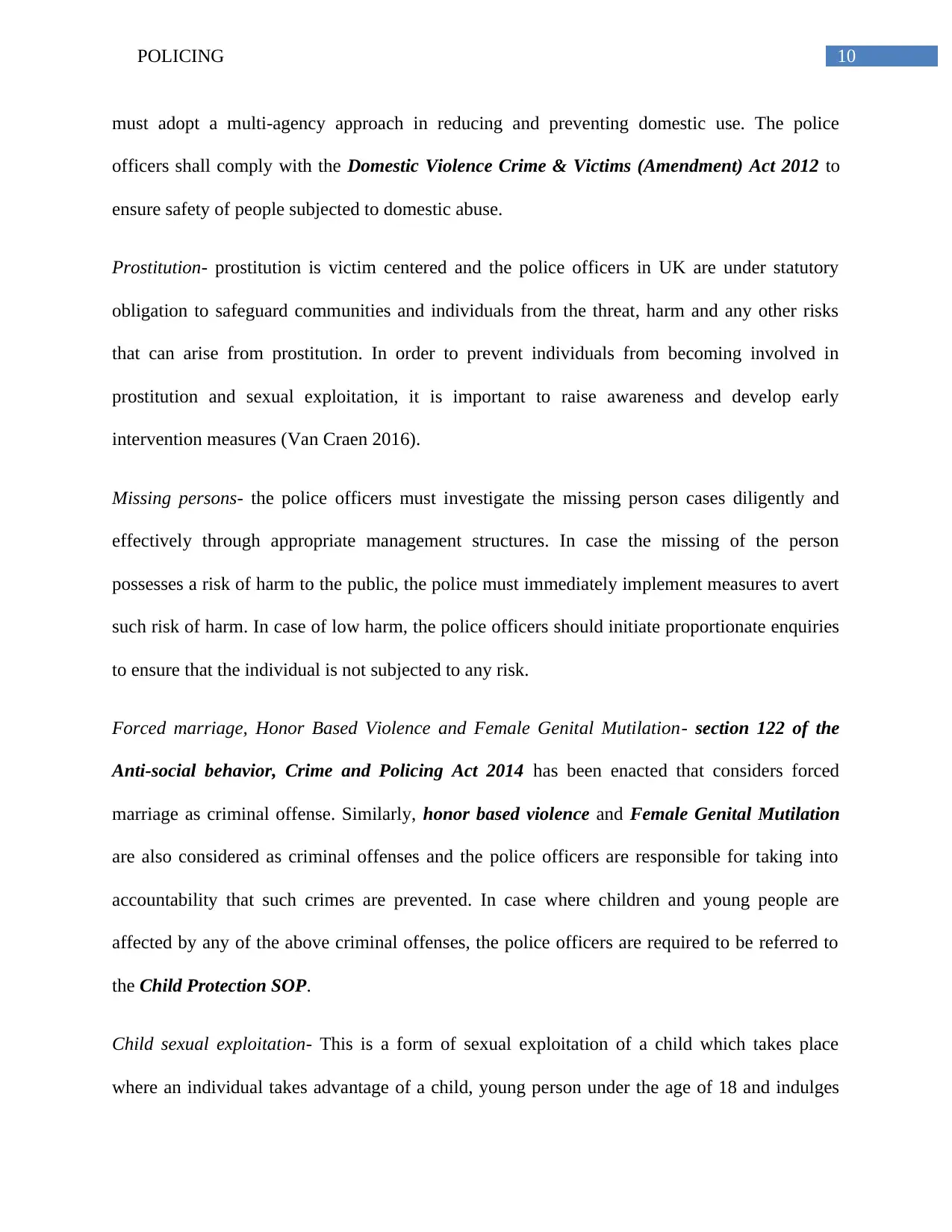
10POLICING
must adopt a multi-agency approach in reducing and preventing domestic use. The police
officers shall comply with the Domestic Violence Crime & Victims (Amendment) Act 2012 to
ensure safety of people subjected to domestic abuse.
Prostitution- prostitution is victim centered and the police officers in UK are under statutory
obligation to safeguard communities and individuals from the threat, harm and any other risks
that can arise from prostitution. In order to prevent individuals from becoming involved in
prostitution and sexual exploitation, it is important to raise awareness and develop early
intervention measures (Van Craen 2016).
Missing persons- the police officers must investigate the missing person cases diligently and
effectively through appropriate management structures. In case the missing of the person
possesses a risk of harm to the public, the police must immediately implement measures to avert
such risk of harm. In case of low harm, the police officers should initiate proportionate enquiries
to ensure that the individual is not subjected to any risk.
Forced marriage, Honor Based Violence and Female Genital Mutilation- section 122 of the
Anti-social behavior, Crime and Policing Act 2014 has been enacted that considers forced
marriage as criminal offense. Similarly, honor based violence and Female Genital Mutilation
are also considered as criminal offenses and the police officers are responsible for taking into
accountability that such crimes are prevented. In case where children and young people are
affected by any of the above criminal offenses, the police officers are required to be referred to
the Child Protection SOP.
Child sexual exploitation- This is a form of sexual exploitation of a child which takes place
where an individual takes advantage of a child, young person under the age of 18 and indulges
must adopt a multi-agency approach in reducing and preventing domestic use. The police
officers shall comply with the Domestic Violence Crime & Victims (Amendment) Act 2012 to
ensure safety of people subjected to domestic abuse.
Prostitution- prostitution is victim centered and the police officers in UK are under statutory
obligation to safeguard communities and individuals from the threat, harm and any other risks
that can arise from prostitution. In order to prevent individuals from becoming involved in
prostitution and sexual exploitation, it is important to raise awareness and develop early
intervention measures (Van Craen 2016).
Missing persons- the police officers must investigate the missing person cases diligently and
effectively through appropriate management structures. In case the missing of the person
possesses a risk of harm to the public, the police must immediately implement measures to avert
such risk of harm. In case of low harm, the police officers should initiate proportionate enquiries
to ensure that the individual is not subjected to any risk.
Forced marriage, Honor Based Violence and Female Genital Mutilation- section 122 of the
Anti-social behavior, Crime and Policing Act 2014 has been enacted that considers forced
marriage as criminal offense. Similarly, honor based violence and Female Genital Mutilation
are also considered as criminal offenses and the police officers are responsible for taking into
accountability that such crimes are prevented. In case where children and young people are
affected by any of the above criminal offenses, the police officers are required to be referred to
the Child Protection SOP.
Child sexual exploitation- This is a form of sexual exploitation of a child which takes place
where an individual takes advantage of a child, young person under the age of 18 and indulges
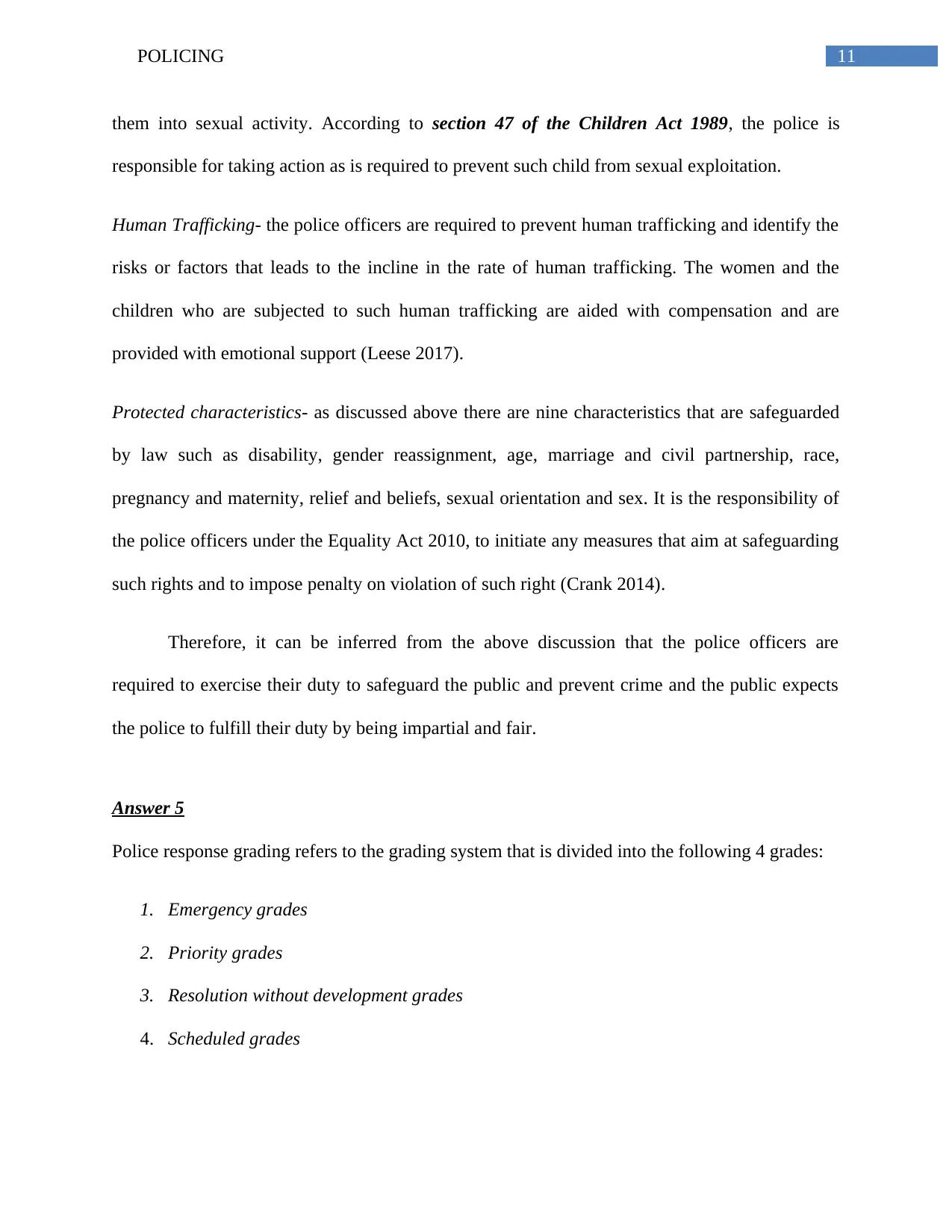
11POLICING
them into sexual activity. According to section 47 of the Children Act 1989, the police is
responsible for taking action as is required to prevent such child from sexual exploitation.
Human Trafficking- the police officers are required to prevent human trafficking and identify the
risks or factors that leads to the incline in the rate of human trafficking. The women and the
children who are subjected to such human trafficking are aided with compensation and are
provided with emotional support (Leese 2017).
Protected characteristics- as discussed above there are nine characteristics that are safeguarded
by law such as disability, gender reassignment, age, marriage and civil partnership, race,
pregnancy and maternity, relief and beliefs, sexual orientation and sex. It is the responsibility of
the police officers under the Equality Act 2010, to initiate any measures that aim at safeguarding
such rights and to impose penalty on violation of such right (Crank 2014).
Therefore, it can be inferred from the above discussion that the police officers are
required to exercise their duty to safeguard the public and prevent crime and the public expects
the police to fulfill their duty by being impartial and fair.
Answer 5
Police response grading refers to the grading system that is divided into the following 4 grades:
1. Emergency grades
2. Priority grades
3. Resolution without development grades
4. Scheduled grades
them into sexual activity. According to section 47 of the Children Act 1989, the police is
responsible for taking action as is required to prevent such child from sexual exploitation.
Human Trafficking- the police officers are required to prevent human trafficking and identify the
risks or factors that leads to the incline in the rate of human trafficking. The women and the
children who are subjected to such human trafficking are aided with compensation and are
provided with emotional support (Leese 2017).
Protected characteristics- as discussed above there are nine characteristics that are safeguarded
by law such as disability, gender reassignment, age, marriage and civil partnership, race,
pregnancy and maternity, relief and beliefs, sexual orientation and sex. It is the responsibility of
the police officers under the Equality Act 2010, to initiate any measures that aim at safeguarding
such rights and to impose penalty on violation of such right (Crank 2014).
Therefore, it can be inferred from the above discussion that the police officers are
required to exercise their duty to safeguard the public and prevent crime and the public expects
the police to fulfill their duty by being impartial and fair.
Answer 5
Police response grading refers to the grading system that is divided into the following 4 grades:
1. Emergency grades
2. Priority grades
3. Resolution without development grades
4. Scheduled grades
⊘ This is a preview!⊘
Do you want full access?
Subscribe today to unlock all pages.

Trusted by 1+ million students worldwide
1 out of 15
Related Documents
Your All-in-One AI-Powered Toolkit for Academic Success.
+13062052269
info@desklib.com
Available 24*7 on WhatsApp / Email
![[object Object]](/_next/static/media/star-bottom.7253800d.svg)
Unlock your academic potential
Copyright © 2020–2026 A2Z Services. All Rights Reserved. Developed and managed by ZUCOL.





